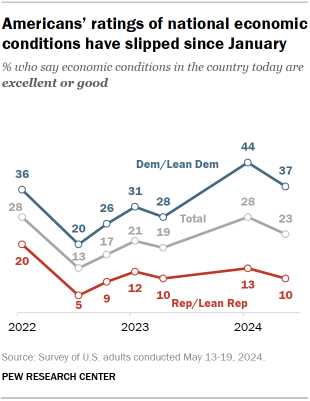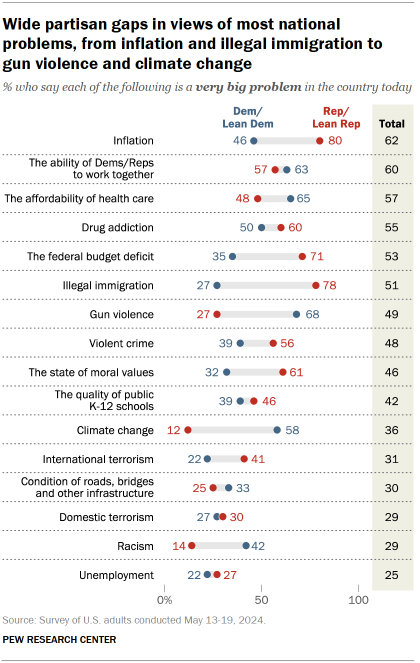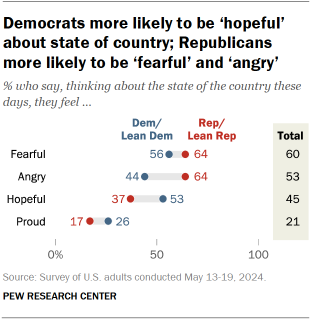Majorities in both parties remain fearful about the state of the country

Pew Research Center conducted this study to understand Americans’ views of the economy and problems facing the country. For this analysis, we surveyed 8,638 adults from May 13-19, 2024. Everyone who took part in this survey is a member of the Center’s American Trends Panel (ATP), an online survey panel that is recruited through national, random sampling of residential addresses. This way nearly all U.S. adults have a chance of selection. The survey is weighted to be representative of the U.S. adult population by gender, race, ethnicity, partisan affiliation, education and other categories. Read more about the ATP’s methodology.
Here are the questions used for this report, along with responses, and the survey methodology.
Inflation may be cooling, but it continues to loom large over Americans’ evaluations of the country and the economy.

Today, 23% of U.S. adults say the economy is in excellent or good shape, down from 28% in January but higher than the 19% who rated the economy positively last April.
- The recent negative slide in economic ratings has mainly taken place among Democrats and those who lean to the Democratic Party: 37% rate the economy positively today, down from 44% in January (but up from 28% last spring).
- Republicans and Republican leaners’ views are little changed over this period – only one-in-ten rate the economy positively.
The public again sees inflation as one of the top problems facing the nation, with 62% saying inflation is a very big problem for the country – only slightly down from the 65% who said this last year.
But another economic concern – unemployment – is not widely viewed as a very big problem for the country. Just 25% of Americans currently say it’s a very big problem.
What’s in this report?
- National economic and personal financial ratings (Chapter 1)
- Trends in views of the top problems facing the nation (Chapter 2)
Views of top problems facing the nation
Two other economic concerns – the affordability of health care and the federal budget deficit – continue to be seen as very big problems for the country.

The public’s list of the top problems facing the nation also includes drug addiction, illegal immigration, gun violence and violent crime. Each of these is seen as a very big problem by roughly half of the public.
- “The ability of Republicans and Democrats to work together” also continues to rate as a top problem.
- Of the 16 concerns included in the survey, it’s the only one that majorities in both partisan coalitions (57% of Republicans and 63% of Democrats) say is a very big problem for the country.
In contrast, the Pew Research Center survey of U.S. adults, conducted May 13-19 among 8,638 members of the Center’s nationally representative American Trends Panel, finds:
- Republicans and GOP leaners are far more likely than Democrats and Democratic leaners to see illegal immigration, the federal budget deficit and inflation as major problems.
- Democrats are considerably more likely than Republicans to view climate change, gun violence and racism as major national problems.
Americans’ views of the state of the nation
Americans continue to be more likely to feel fearful and angry about the state of the nation than to feel hopeful or proud – and this has largely been the case since Pew Research Center first asked these questions in June 2020.

Since Joe Biden won the 2020 presidential election, Democrats have been considerably more likely than Republicans to express positive emotions about the state of the country (and less likely to express negative emotions). This is a reversal of the partisan patterns on these questions during the Trump administration.
Still, majorities in both parties – 64% of Republicans and 56% of Democrats – say they are fearful about the state of the country.
The public also continues to express much more dissatisfaction than satisfaction with the state of the nation – a trend that dates back decades. Today, 78% of Americans are dissatisfied with national conditions, while 22% are satisfied (34% of Democrats and 10% of Republicans).




